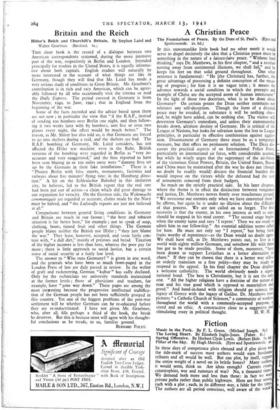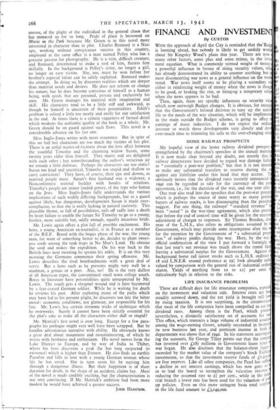Fiction
IN these days of competence plots abound and if plot alone vm the tide-mark of success most authors would earn hand tributes and all would be well. But can plot, by itself, sup the entire weight of a novel on its brittle bones? Many an& it would seem, think so. Are ideas enough? Current CVO catastrophies, war and rumours of war? No, a thousand titres We demand both more and less than these: in fact we on private paths rather than public highways. Here are four no each with a plot ; each, in its different way, a fable for the tiro The authors Are all period conscious, well aware of the wor unease, of the plight of the individual in the general chaos that has menaced us for so long. Pride of place is bestowed on Music in the Park bescause Mr. Green is in this novel more interested in character than in plot. Charles Rennard is a Nazi spy, working without conspicuous success in this country, employed at the same office is a man named Pelley who has a genuine passion for photography. He is a vain, difficult creature, and Rennard, determined to make a tool of him, flatters him skilfully. In the background is Pelley's sister, no longer a girl, no longer an easy victim. She, too, must be won before her brother's especial talent can be safely exploited. Rennard makes the attempt. In doing so, he discovers realities which are deeper than material needs and desires. He does not reform or change his nature, but he does become conscious of himself as a human being, with needs that are personal, private and exclusively his own. Mr. Green manages his material with imagination and skill. His characters tend to be a little stiff and awkward, as though he himself is uncertain of their potentialities. Edith's problem is solved a little too neatly and easily for our satisfaction in the end. At times there is a certain vagueness of factual detail which weakens the authentic quality of the book as a whole. Mr. Green should be on guard against such flaws. This novel is a considerable advance on his last one.
Miss Inglis-Jones writes with more assurance. But in spite of this we feel her characters are too much the victims of her plot. There is an artful matter-of-factness about the love affair between the youthful Timothy and the charming widow Susan, some twenty years older than himself. They marry and are delighted with each other ; but notwithstanding the author's veracious air we remain a little dubious. Perhaps the characters-are too static? Susan too kind and uncritical, Timothy too stupid and shallow to carry conviction! They have, of course, their ups and downs, as married people must. Susan's first husband was a widower, a Nonconformist teetotal builder with hordes of relations. Timothy's people are minor landed gentry, of the type who batten on the Jews. Miss Inglis-Jones fully understands the various implications of such widely differing backgrounds, but as a guard against likely, but dangerous, developments Susan is made over- complacent, so that she is really lacking in natural curiosity. This plausible theme, so full of possibilities, tails off sadly into a death by heart failure to enable the future Sir Timothy to go to a young, fresher, more suitable but, oddly enough, equally incurious bride.
Mr. Lewis again offers a plot full of possible excitement. His hero, a young American ex-journalist, is in France as a member of the B.E.F. Bored with the bogus phase of the war, the young man, for want of something better to do, decides to plant sweet- pea seeds among the tank traps in No Man's Land. He obtains the seed and makes the expedition. On his way back to the British lines next morning he sprains his ankle. It is on this very morning the Germans commence their spring offensive. Mr. Lewis describes the rival bombardments with a great deal of verve. But a hero such as he presents might very well be a madman, a genius or a poet. Alas, no! He is the very dullest of all American types, the conventional small town college youth. Bores in literature have potentialities quite unsuspected by Mr. Lewis. The youth gets a shrapnel wound and is later bayoneted by a fear-crazed German soldier. While he is waiting for death he reviews his past. After exploring many of the paths which may have led to his present plight, he discovers too late the bitter moral: economic conditions, not glamour, are responsible for his fate. Mr. Lewis has certain tiresome tricks of technique which he overworks. Surely it cannot have been strictly essential for the plot's sake to make all the characters either dull or stupid?
Mr. Merrick's first novel is over long. Except for a few para- graphs his prologue might very well have been scrapped. But he handles adventurous narrative with ability. He obviously knows a great deal about mountains and mountaineering, of which he writes with freshness and enthusiasm. His novel moves from the Lake District to Europe, and by way of India to Thibet, where his hero discovers a peak (he has long suspected its existence) which is higher than Everest. He also finds an earthly Paradise and falls in love with a young German woman whose life he has saved. She in turn saves his by nursing him through a dangerous illness. But their happiness is of short duration for death, in the shape of an accident, claims her. Most of the novel is made credibly exciting, but the characterisation is not very convincing. If Mr. Merrick's ambition had been more modest he would have achieved a greater success.
JOHN HAMPSON.



























 Previous page
Previous page